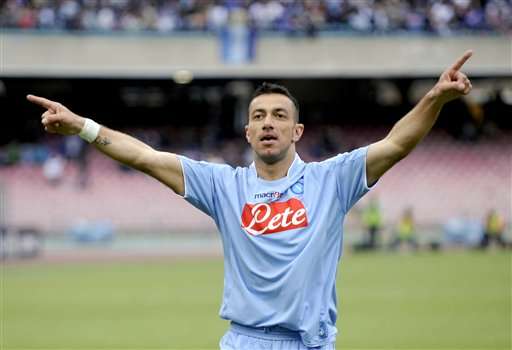At 35, meandering Sampdoria striker Fabio Quagliarella has had the most prolific season of his career. While his talent has always been obvious — often catching the eye with a host of sensational strikes — his career and his life were nearly derailed by a stalker. Nevertheless, manager Marco Giampaolo has finally helped Quagliarella find consistency.
“It would be one of those goals that, at the time, only Maradona could score. A weird goal, something that would make people go crazy… a long-range shot, a powerful kick in the last second of an important match.” Fabio Quagliarella’s childhood dream would come true, eventually. After a somewhat meandering career, encompassing the spectacular and the downright horrifying, Quagliarella has had the best season of his life at 35. Although he may have morphed into a more orthodox striker at Sampdoria under Marco Giampaolo, the “long-range shot and powerful kicks” have long been his trademark.
“With him they know there’s no escape, he shoots from the midfield and with no problem he scores a goal,” Napoli fans would sing, “he is not able to score a normal goal but we like him this way, he makes the whole city dream.” Player specific songs are rare at the San Paolo, Diego Maradona heading a small group to be honoured, but Fabio Quagliarella’s song, (he was born in Castellammare di Stabia just along the coast from Naples), is well earned. An astounding volley “against my Napoli” as Quagliarella, a boyhood fan, put it, won the Italian the goal of the season award in 2009 when playing for Udinese. Incredibly, that strike merely competes to be his best ever.
An audacious chip for 25 yards as Italy desperately chased down Slovakia at the World Cup in 2010; a near-post back heel against Udinese when with Juventus; and an absurd 40 yard lob on the turn during his first spell with Samp away at Chievo join countless volleys, delightful chips, bicycle kicks and long-range rockets. While songs sung from terraces are often hyperbolic, given that Quagliarella’s league total has only recently surpassed 150, endless YouTube compilations of glorious strikes lend support to the idea that he really is “not able to score a normal goal.” The late editor of the Gazzetta dello Sport, Candido Cannavo even went as far as to describe Quagliarella’s goals as “beautiful and impossible.”
This season, however, has been different. 19 goals in 33 Serie A games represents the zenith of Quagliarella’s career, 13 being the high watermark previously, while his all-action, speculative displays have been moulded into more predatory, composed outings leading Sampdoria’s front line. In almost inevitable Italian fashion, the 35-year-old joins a host of fellow Serie A forwards to thrive in their 36th year; Alessandro Del Piero scored 13 goals and took 10 assists, Francesco Totti managed 15 goals and 11 assists while Antonio Di Natale reached 29 strikes with 8 assists.
“There are no secrets,” the forward explains “it is love for this job if you can call it that, with the desire to improve myself always, because I am very critical of myself. The environment [at Samp] I like a lot, the coach is very good. It’s a mix that makes me feel good.” Finding the right environment has been something of a career-long pursuit for Fabio. The move to Sampdoria, arriving in the 2016 winter window, was Quagliarella’s tenth as a professional, having also spent the 2006-07 campaign at the Marassi. After a smattering of outings with Torino as a youngster at the turn of the century, Quagliarella had to wait until the 05-06 season to establish himself in the top tier with a miserly 3 goal haul across 34 league games for then Serie A midtable outfit Ascoli.
Sampdoria would, not for the last time, prove to be the right place for Quagliarella as 13 in 35 the following season finally saw him establish himself at 24 years of age, having been first noticed at just 5 playing in his back garden. A pair of productive seasons as part of an exciting Udinese side which included Di Natale and Alexis Sanchez followed a move home to Napoli. “A dream comes true,” beamed Quagliarella upon signing, “I’ve always been a blues fan.” Shockingly, however, that dream would fade in hellacious circumstances.
“I always had imagined myself as captain of Napoli; of winning something with them because they were becoming as good a team as they are now,” Quagliarella told Mediaset last year. “If none of this had happened, I am certain I would still be playing there now.” After just one season, however, he was gone. “A stalker tormented me for over five years,” Fabio told newspaper Le Iene, “It started with a password problem. Then I started getting anonymous letters with pictures of naked girls, accusing me of pedophilia, of working with the Camorra [the mafia], of dealing drugs, of fixing games.”
The player’s family and friends were also targeted as the situation escalated. “My father received threatening messages,” Quagliarella explained, “They told him that someone would shoot me in the head or that they’d blow up my home with a bomb.” Napoli were sent letters too, falsely accusing Fabio of the same crimes. “Any tiny scare suddenly became a huge danger, once you knew about these threats. You felt constantly like you were being watched, under threat, always looking to see who was eyeing you sideways. You cannot imagine the tension just being at home.”
A man close to Quagliarella, a police officer, had been aiding the Quagliarella family in investigating the stalker but that investigation got nowhere. “In the end, my father figured it out,” Fabio recounts. “He realised the authorities never got my formal complaints because the stalker was keeping them all to himself.” His friend, the policeman, had been the stalker. These “investigations” came to nothing because the stalker kept all Quagliarella’s complaints to himself and continued to send threatening messages. Although the policeman’s crimes were eventually unearthed, Quagliarella was advised not to discuss the case and he was sold unceremoniously to Juventus in 2010.
“People accused me of leaving Napoli for money, but that was not true and really annoyed my family. The fans cared for me and felt betrayed, but they couldn’t know the real reason I left.” As a result, Napoli’s notoriously vociferous support labelled him a “traitor.” “I tried to let them know how much I loved Napoli with little gestures, like refusing to celebrate after a goal for Torino.” Quagliarella explained, “I knew of the importance of this [playing for Napoli] for my city,” the forward asserted in a harrowing interview with the Bleacher Report last year, his love for the club unwavering. “Napoli fans saw themselves in me. I knew I was not alone when entering the pitch, but I was there with a whole city. It was the dream of many fans, which I was realizing.”
By all accounts, Quagliarella is a genuine and thoughtful professional. Although his classically Italian wide-eyed goal celebrations might hint otherwise, “he’s a serious and humble guy,” says Aniello Bardella, Quagliarella’s first trainer at youth club Junior Gragnano, “At 9 he already thought only of training every day.” Having left home at just 13 for a boarding school in Turin at the other end of the country, Fabio found it tough. “I called home at three in the morning, in tears. I spoke with my mother, I wanted to come back to her.” But young Fabio stoically carried on. “I owe everything to my family who supported me with a thousand sacrifices,” he later maintained, speaking with Napoli’s daily newspaper, Il Mattino.
That work ethos remains true today. “He knows how to do things, he knows how to train, he has played important games in his career, he is mature but he is also supported by an excellent physical condition,” praises Giampaolo “at 34-35 years old has an enviable physical and mental condition.” Clearly an admirer, Giampaolo made Quagliarella his captain at Samp this season. “Fabio has reached a very high level of reliability and perfection in training… there are players who have perceptions of space and time that others do not have.”
Fabio Quagliarella’s career has been an undulating one but he has handled the peaks and troughs with a quiet resolution and respect, from his outrageous goals to his shirt number. Quagliarella’s ever-present number 27 is in honour of Niccolo Galli, a former friend and youth academy teammate who died in a road accident back in 2001. Napoli fans’ tribute to Quagliarella remains the most fitting, however. When news of Quagliarella’s stalker ordeal emerged, a banner at the San Paolo read: “You’ve lived through hell with enormous dignity. We will embrace you again, Fabio, son of this city.”
This piece is from European football periodical “Onside Inzaghi” download a free copy now.









